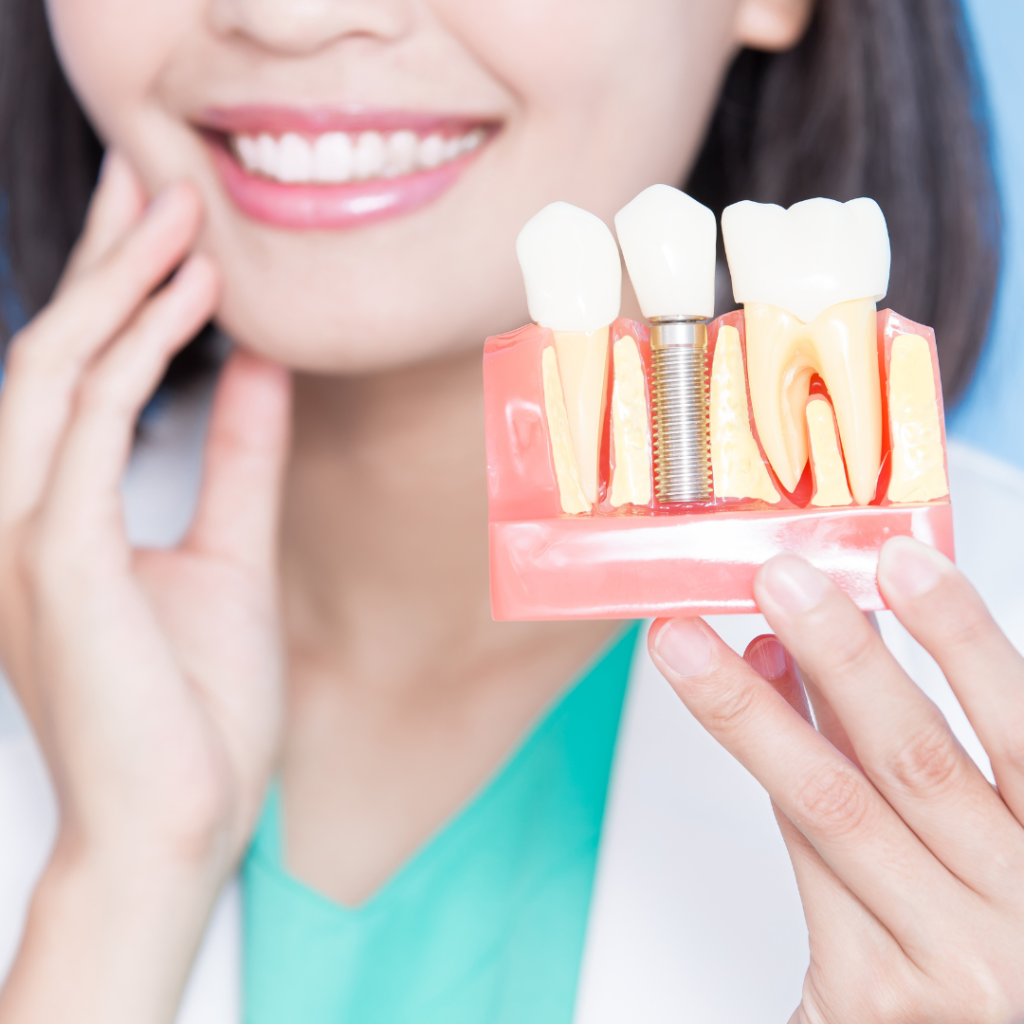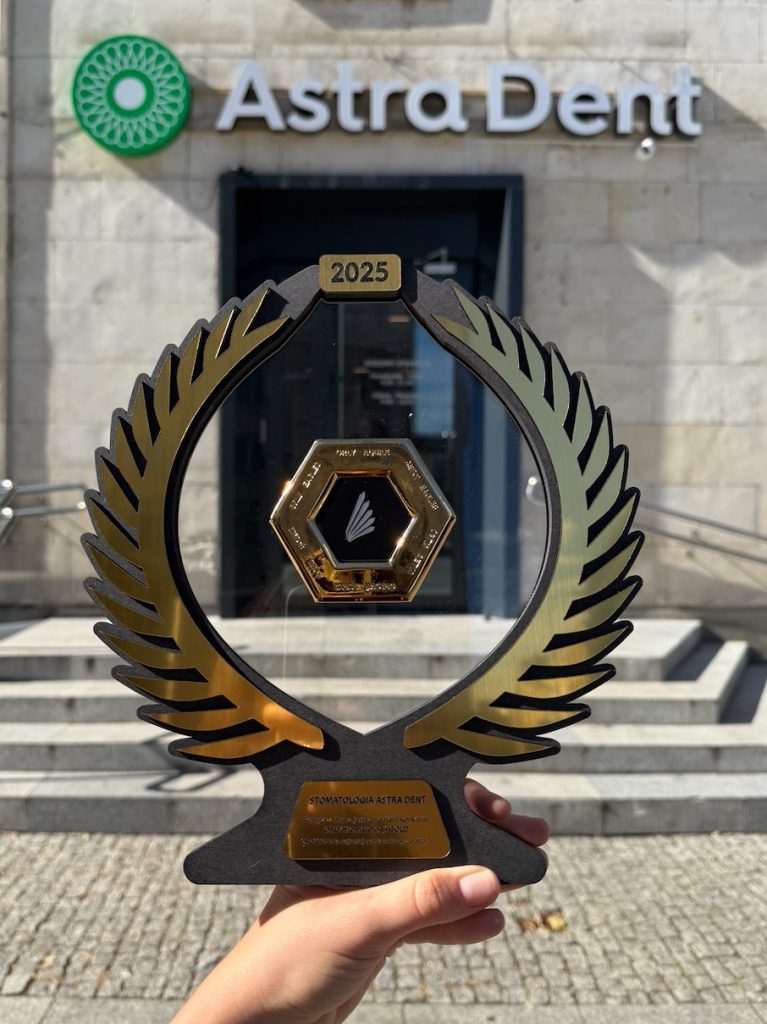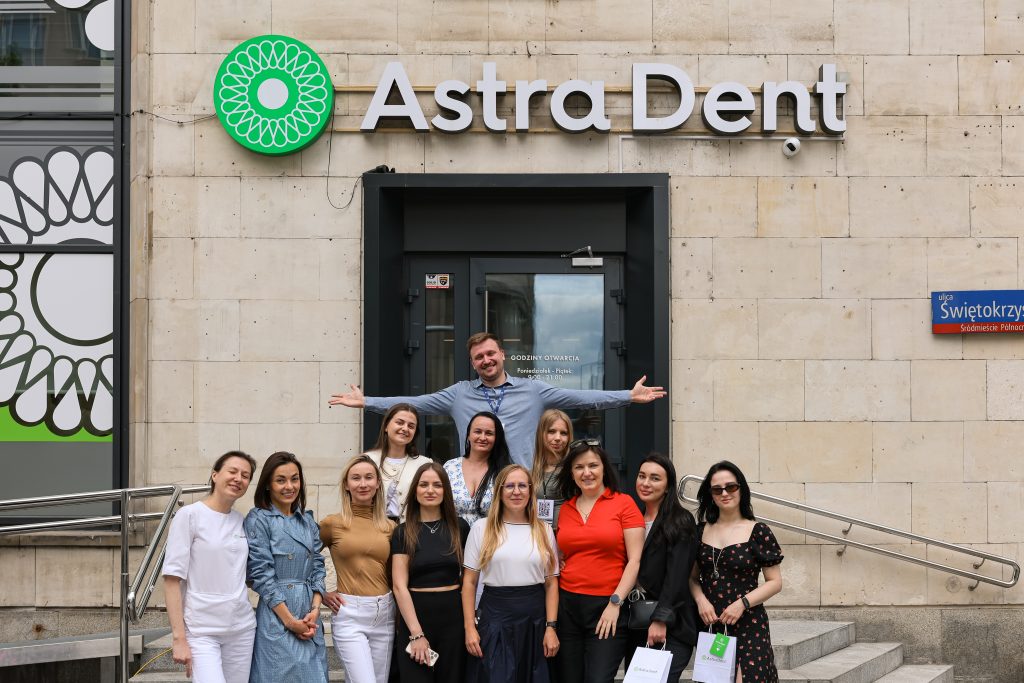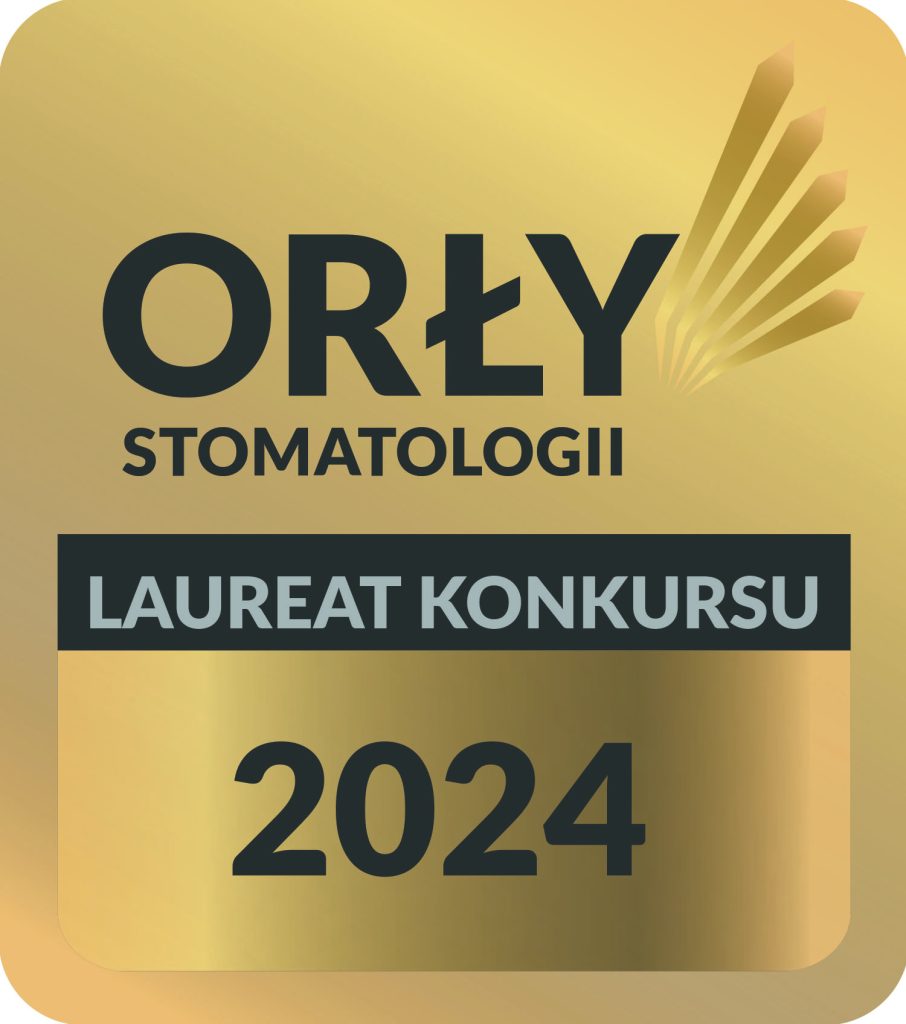Metal-ceramic crown in Warsaw – a durable and aesthetic solution
A metal-ceramic crown is an orthopedic structure consisting of a metal frame and an outer layer of ceramics. The base is made of biocompatible cobalt-chromium or titanium alloys that can withstand loads of up to 800 MPa. The outer ceramic lining reproduces the color, shine and transparency of natural enamel, making the tooth look natural.
A durable aesthetic crown is designed to restore damaged teeth, cover after endodontic treatment or as the final stage of implantation.
What is a metal-ceramic crown?
There are various approaches to restoring teeth using orthopedic structures, and one of the most proven solutions is a metal-ceramic crown. The technique combines the high strength of metal and the natural aesthetics of ceramics. With high-quality manufacturing and regular care, the average service life of crowns is from 10 to 15 years. Due to their versatility, they are often chosen to restore both front and chewing teeth.
Main features of metal-ceramic crowns:
- Metal frame. Made of cobalt-chromium alloy or titanium. The materials are biocompatible, do not cause allergies and withstand loads equal to the force of pressure on chewing teeth when chewing hard food.
- Ceramic veneer. Imitates the color and transparency of enamel, which allows you to choose a shade for neighboring teeth. Modern ceramics do not change color even after years of use.
- Purpose. Used to restore damaged teeth, complete prosthetics on dental implants, as well as to strengthen teeth after endodontic treatment.
- Manufacturing technology. Astra Dent Warsaw uses CAD/CAM systems and digital impressions, which ensures a tight fit to the supporting tooth or implant.
Another advantage of metal-ceramic structures is the stability of size and shape. The framework does not deform under constant loads, and the ceramic coating maintains a smooth surface, which reduces plaque accumulation and simplifies hygiene.
Why do patients trust the installation of a metal-ceramic crown to dentists Astra Dent Warsaw?
The quality of manufacturing and precision of fit affect the durability of the crown. In the case of prosthetics, complications occur infrequently, but are still recorded. For example, technical problems (chips, loosening or wear) are observed within 10 years after installation on implants in 13.5-30.6% of cases. Therefore, it is important to choose medical institutions that use modern technologies and ensure accuracy of work.
Advantages of installing metal-ceramic crowns at Astra Dent in Warsaw:
- Experienced doctors. The medical center employs orthopedist dentists with many years of experience in prosthetics, who use 3D tomography and digital planning to reduce the risk of errors.
- Modern laboratories and CAD/CAM technologies. Thanks to digital scanners and milling machines, crowns are manufactured with micron accuracy, which reduces the likelihood of complications and speeds up prosthetics.
- Quality assurance and patient support. Astra Dent provides a warranty period for orthopedic structures and conducts control examinations to detect the slightest changes at an early stage.
- Convenient location. The dentistry is located in the central part of Warsaw, which makes it possible to combine visits with work or study schedules. There are convenient transport interchanges and parking areas nearby, so you can get there both by public transport and by your own car.
- Support in Ukrainian. Patients from Ukraine receive consultation and support in their native language. The absence of a language barrier allows you to discuss the treatment plan and ensures that all the doctor’s recommendations will be understood without unnecessary explanations.
The combination of the professionalism of doctors, modern technical equipment and constant support of patients gives a predictable and safe result. Every stage is monitored – from diagnostics and planning to checking the bite after installing the crown. For patients, this means confidence that any possible changes or questions will not be ignored.
Indications for installing a metal-ceramic crown
Metal-ceramic crowns remain the gold standard in prosthetics, especially in the area of chewing teeth. According to research results, they do not lose functionality even 3-10 years after installation. The indicators are higher than for many other prosthetic methods.
Astra Dent specialists prescribe metal-ceramic in the following cases:
- Significant destruction of the crown part of the tooth. A crown restores the anatomical shape and strength of a tooth when a filling or inlay does not cope with the task.
- Completion of treatment after endodontic procedures. After nerve removal, teeth become more fragile, and the crown protects them from cracks and repeated destruction.
- Implant prosthetics. Metal-ceramic structures are installed on artificial roots in the chewing area, where special endurance is required.
- Correction of the shape and color of teeth. A crown helps to correct pronounced aesthetic defects, masks a change in shade and restores the harmony of the dentition.
Metal-ceramic prosthetics is an investment in safe, accurate and long-term tooth work. The structure stably transfers chewing load to bone tissue, which prevents its atrophy (reduction in volume and density). The ceramic surface does not absorb dyes, preserving the color with daily coffee or tea consumption.
The process of installing a metal-ceramic crown at Astra Dent Warsaw
Prosthetics is a complex technological chain, in which each stage affects the accuracy of the fit and durability of the structure. All manipulations at Astra Dent in Warsaw are carried out according to a digital protocol to reduce errors and shorten the treatment time for the patient.
Consultation and diagnostics
The first stage involves a comprehensive assessment of the condition of the teeth and tissues, which allows you to draw up an accurate prosthetics plan. The doctor conducts an examination under magnification, after which they prescribe:
- Orthopantomography (panoramic image). Allows us to assess the position of all teeth, detect hidden foci of inflammation and check the condition of bone tissue.
- Sighting X-ray. Used for local diagnostics of a specific tooth to see the quality of canal fillings and the presence of microcracks.
- Cone-beam computed tomography (CT). Creates a three-dimensional model of the jaw to assess bone density, root position and proximity of anatomically important structures, such as the maxillary sinuses.
The combination of digital methods gives a complete picture – from the general condition of the dentition to the smallest details that are invisible during a routine examination. An integrated approach reduces the risk of complications and ensures the accuracy of the subsequent stages of prosthetics.
Tooth preparation
At the second stage, the dentist forms a support for the future crown. The task is to remove the minimum amount of tissue, creating an ideal shape for reliable fixation. The process is performed under microscope control:
- Hard tissue preparation. The doctor uses high-speed water-cooled turbine tips to avoid overheating of the enamel and dentin.
- Conical shaping. The edge of the abutment tooth is modeled at a certain angle to ensure that the crown fits without micro-gaps.
- Reinforcement after endodontic treatment. If the tooth has previously been treated for pulpitis, a fiberglass post is placed in the canal to evenly distribute the load.
- Temporary crown. For the period of manufacturing the permanent structure, the tooth is protected by a temporary overlay that preserves aesthetics and prevents sensitivity.
Careful preparation ensures that the future crown will receive a stable base and will work under chewing load without the risk of damage.
Impression taking / scanning
At this stage, an accurate digital or physical model of the dentition is formed, which will become the basis for manufacturing the crown. At Astra Dent, priority is given to digital methods, because they are more accurate and comfortable for the patient:
- Intraoral scanning. Using a scanner, we create a three-dimensional model of the teeth with an accuracy of 10-15 microns. Scanning takes a few minutes and does not cause discomfort, unlike traditional impression materials.
- Digital bite check. The model is immediately displayed on the screen, where the doctor can assess the contacts of the teeth and make corrections even before the crown is made.
- Traditional impression. In cases where digital scanning is not possible, a silicone-based impression material is used. It allows you to recreate the relief of the gums and neighboring teeth for precise adaptation of the structure.
Thanks to digital technologies, the time for making a crown is reduced, and the risk of errors associated with material deformation is practically eliminated.
Manufacturing a crown in the laboratory
After receiving a digital model or physical impression, the data is transferred to the dental laboratory:
- Design in a CAD system. The digital file is processed in special software, where the shape of the future crown is modeled taking into account the bite, anatomy of neighboring teeth and chewing load.
- Milling of the framework. The base is made of cobalt-chromium alloy or titanium on five-axis machines. This guarantees accuracy of fit to microns and stability of the structure under load.
- Ceramic application. A ceramic mass is applied layer by layer to the framework, which is baked in an oven at a temperature of 800-900 °C. The technology ensures the strength of the connection and natural transparency.
- Color selection. The shade is determined according to the Vita scale – a standard with a set of enamel color samples, with the possibility of individual correction, so that the crown matches natural teeth and has a harmonious appearance in a row.
At the final stage, polishing and glazing are performed, due to which the surface becomes smooth.
Fitting and fixation
The final work involves several procedures aimed at checking the accuracy and reliability of the fixation of the structure:
- Preliminary fitting. The doctor assesses the fit of the crown, contacts with neighboring teeth and the correct bite. If necessary, the inner surface or outer contour is corrected.
- Color check. Comparing the shade with natural teeth in daylight and artificial lighting allows you to make sure of the harmonious appearance of the smile.
- Final fixation. For cementation, we use modern fourth-generation adhesive materials that create a sealed edge and reduce the risk of bacteria penetrating under the crown.
- Control tests. After fixation, the occlusion (closing of the upper and lower teeth) and chewing pressure are checked to avoid overloading individual teeth.
The step-by-step check guarantees a tight fit and stability of the structure. The patient receives a crown that works under full load from the first day and at the same time maintains a natural appearance in everyday life.
Advantages of a metal-ceramic crown for patients
Durability and aesthetics are not the only parameters that patients appreciate in metal-ceramic crowns. The structures have a number of advantages that are confirmed by clinical studies:
- Compatibility with any type of bite. The crown withstands uneven load distribution in pathological bite forms, reducing the risk of chips and cracks.
- Minimum wall thickness. The metal framework allows you to make the crown thinner than all-ceramic counterparts, which preserves more of the tooth’s own tissue during preparation.
- Resistance to temperature changes. The structure does not deform when alternating cold and hot food, which is important for patients with sensitive enamel.
- Smooth surface. Thanks to the glazing of ceramics, the accumulation of plaque is reduced, which facilitates daily hygiene and reduces the risk of gingivitis.
- Predictability of the result. A large array of clinical data allows the doctor to accurately assess the service life and give the patient realistic expectations regarding operation.
A metal-ceramic crown in Warsaw is a rational choice for patients who expect a long-term service of the structure without restrictions in everyday use.
How to make an appointment at Astra Dent Warsaw?
Do not put off taking care of your teeth for later. The Astra Dent dental center is attended by doctors with many years of practice who use modern prosthetics and implantation technologies. You can get a consultation in several ways:
- phone: +48 533 599 552;
- email: info@astradent.pl;
- online form: application on the official website.
Reception is held daily at convenient hours for patients: from 9:00 to 20:00 on weekdays and from 9:00 to 18:00 on weekends. It is enough to choose a time to get a professional consultation and start restoring a healthy smile.






